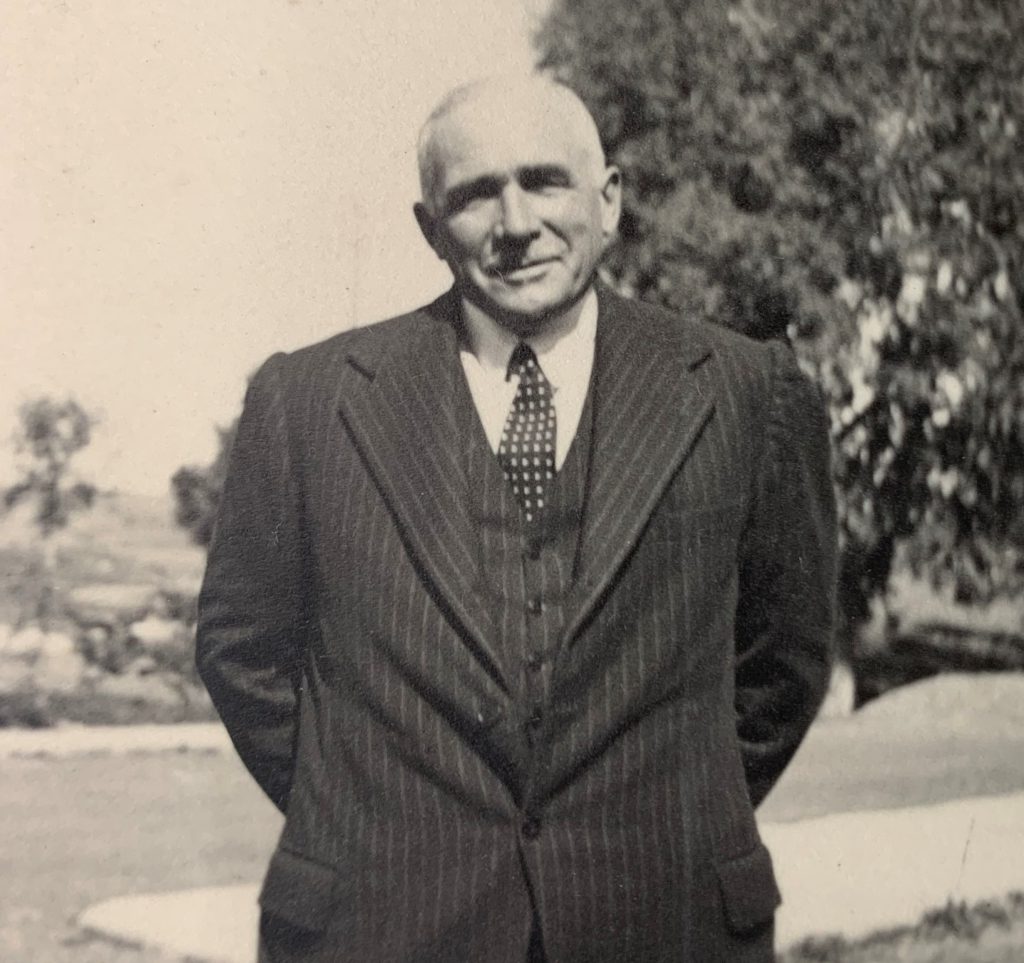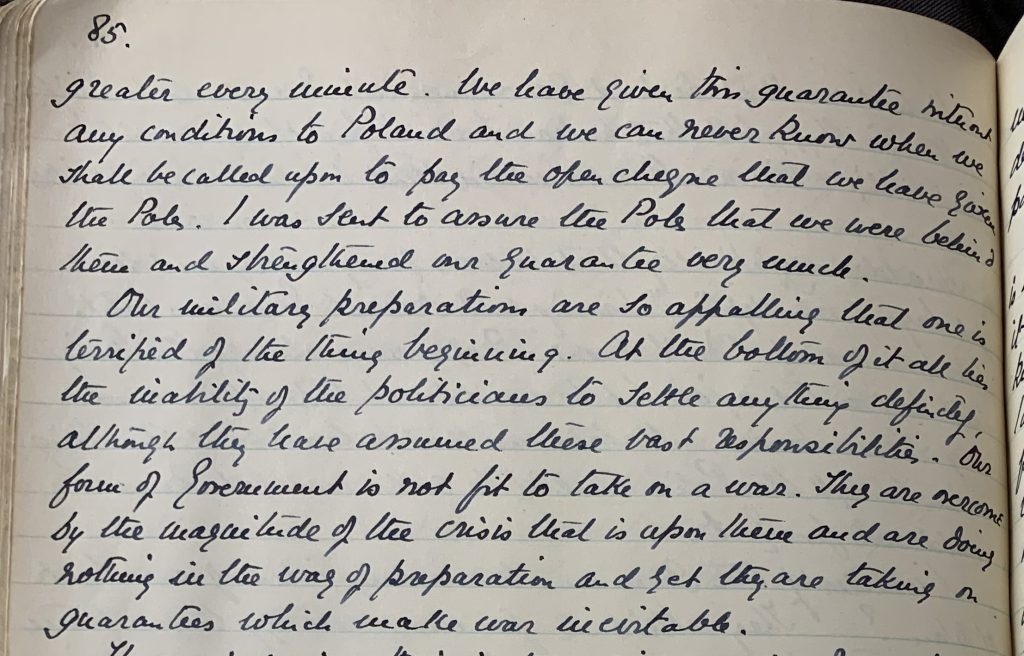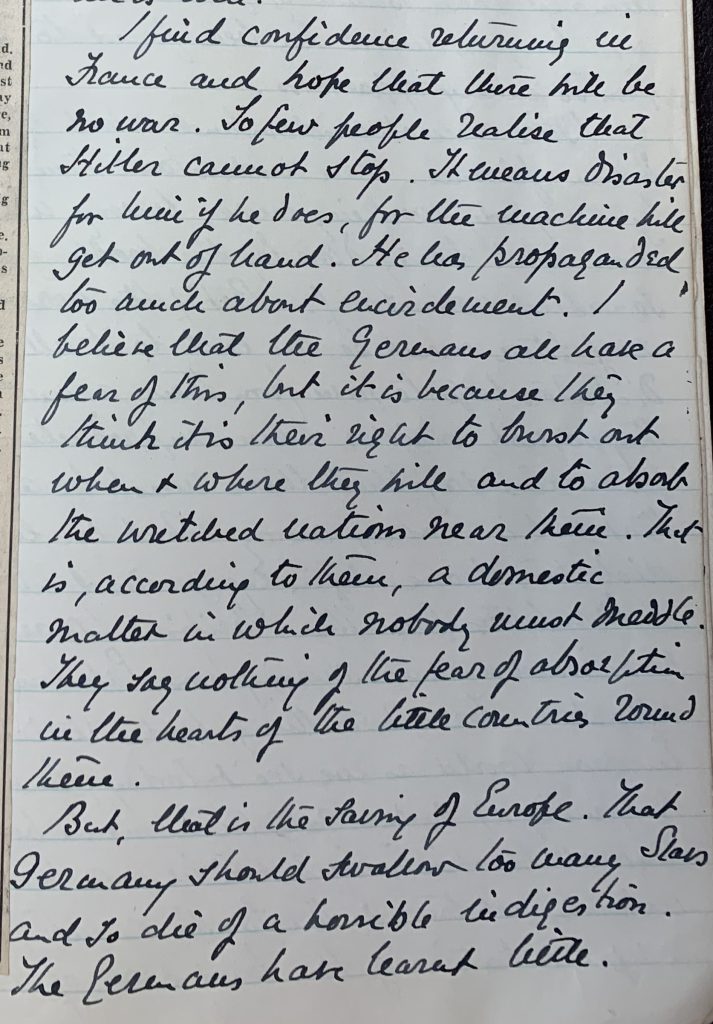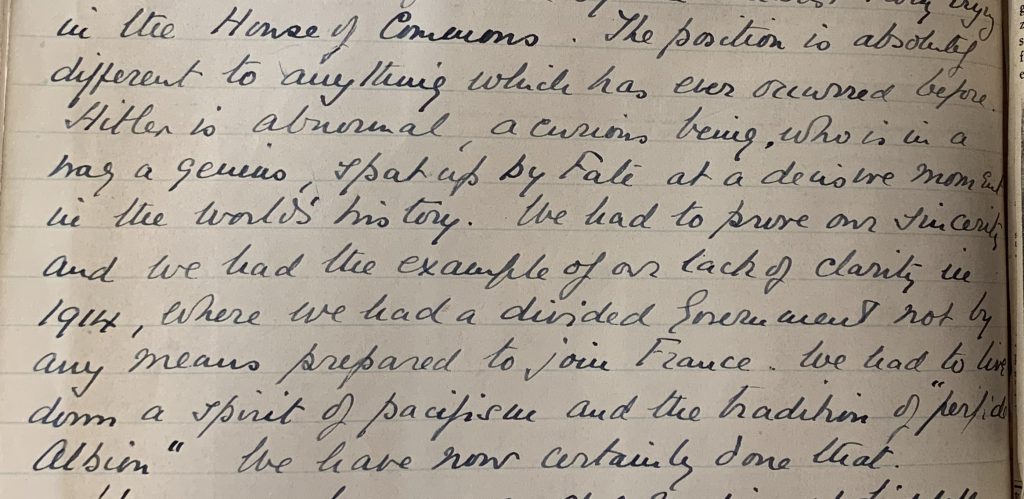By Andrew Stewart, trustee of the Liddell Hart Centre for Military Archives.
The important private papers of Field Marshal Lord Ironside were received earlier this year by the Liddell Hart Centre for Military Archives, an extensive collection which is centred around his 73 bound volumes of private diaries along with many other fascinating letters and documents. While there are two publications which draw heavily on the diaries – Colonel Roderick Macleod’s 1962 edited volume and the authorised biography published in 2018 by Ironside’s son – there were inevitably many entries which failed to be included in either or were much reduced from the original and there remains a great deal for the researcher to examine and consider.

While the wide range of important early twentieth century events covered has been noted previously, specifically his involvement in the fight against the Bolsheviks in Northern Russia, another example is the outbreak of the Second World War. Now 85 years on, even a cursory examination of his daily commentary for the period immediately preceding the declaration of war on 3 September 1939, makes abundantly clear the value not just of his unexpurgated observations but, more widely, the wider significance to historians of this archival collection. His entries throughout that summer, found in the year’s second and third volumes, offer more than three hundred pages of handwritten notes, newspaper clippings and a small selection of official documents. Reading through page after page of tightly, often wonderfully written prose, there is much insight to be found, drawn from a long and distinguished career serving in the British Army having first been mobilised on Christmas Eve 1899 to fight in the South African war. As an often acute eyewitness to history, describing the prelude of what would be his last war, there is also great deal of scepticism and even contempt about those around him and the worsening crisis they all faced.
As his frustration mounted with the lack of preparation and drive he witnessed at the War Office, to where he had returned from his previous role as Governor of Gibraltar, the failings he witnessed were an oft-repeated theme:
“Hopeless confusion everywhere. Well-meaning efforts by a lot of very mediocre men. I suppose they are all still thinking of their political futures. Democracies are not fit to be out on their own in a bad world of dictators”. (Tuesday July 11th, 1939)
“The thing is upon us and we are not ready … We are a damned lot of amateurs at war”. (Sunday July 16th, 1939)
“Our military preparations are so appalling that one is terrified of the thing beginning. At the bottom of it all lies the inability of the politicians to settle anything definitely, although they have assumed these vast responsibilities. Our form of Government is not fit to take on a war. They are overcome by the magnitude of the crisis that is upon them and are doing nothing in the way of preparation and yet they are taking on guarantees which make war inevitable”. (Wednesday August 2nd, 1939)

There were many other forceful views expressed but the final collapse into war was still something of a surprise although he had long anticipated it and was resigned to what lay ahead.
Another regular topic of reflection was the threat that Britain faced and those who were responsible for issuing them. Travelling back home to Britain in June 1939, he wrote of returning confidence in France that there would be no war. But, as he cautioned and echoing similar sentiments expressed most recently to explain Vladimir Putin’s actions in Ukraine, this was unlikely to be the case:
“So few people realise that (Adolf) Hitler cannot stop. It means disaster for him if he does, for the machine will get out of hand. He has propaganded (sic) too much about encirclement. I believe that the Germans all have a fear of this, but it is because they think it is their right to burst out when and where they will and to absorb the wretched nations near them. That is, according to them, a domestic matter in which nobody must meddle … But that is the saving of Europe”. (Thursday June 29th, 1939) He had previously met Hitler – “a curious being, who is in a way a genius, spat up by Fate at a decisive moment in the world’s history” (Sunday July 23rd, 1939) – and in his ‘Memorandum upon our Strategic Preparation’, written in July 1939, he noted: “I am struck by the futility of our strategic preparations in [the] face of the Dictators. We know that the Dictators can choose their moment and, if they have made up their minds to gamble, they will start soon”. He also referred to ‘Mein Kampf’, the guide to understand the future, not least the German leader’s plans for the Slavic and the Jewish peoples. His conclusion was that “the final defeat of Hitler will be by his swallowing of the Jews and the Slavs, the first by destruction and the second by forced domination. To be up against the Slavs is something like being enveloped in a sea of mud. Your every movement is restricted and in the end your energy is sapped and you are smothered”. (Sunday August 6th, 1939) And, upon hearing about the Non-Aggression Pact signed between Germany and Russia: “This alliance … is an unnatural one for Slav and Teuton will never be friends. But, it is an alliance to rule the world. Two Dictators making it possible to ravish where they wish. That is the sinister part of things. It is not merely a temporary expedient to defeat us over the Danzig question. It is something much deeper than that. Now the dismemberment of Poland has been agreed upon and unless Hitler can be impressed by the consequences of carrying out this partition, Poland will be dismembered. We cannot stop it but we can resuscitate it after we have defeated the Germans”. (Sunday August 27th, 1939)
Ironside died before Macleod’s book was published and it would have been interesting to see what, if any, revisions he would have made. The complete version reveals much more, including error and inaccurate assumptions. There is much thought about him taking charge of the British Expeditionary Force as it returned to France to once again stand and fight against Germany but, and much to his dismay, he found himself appointed as the Chief of the Imperial General Staff heading the Army. He was also not always entirely accurate with his assessment of how the war would develop. This all only adds to the atmosphere as presented by someone who was at the heart of the gathering storm.
In 1962, the War Studies Department of King’s College London was founded by Sir Michael Howard, lecturer in Military Studies and one of England’s foremost military historians. Two years later, Howard established a Centre for Military Archives at King’s to complement the new department. The Centre’s remit was simple: it would collect the papers of senior defence personnel of the twentieth century. The official launch of this archive was timed for 1964, to commemorate the 50th anniversary of the outbreak of the First World War. In 1973, the archive was renamed the Liddell Hart Centre for Military Archives in honour of Sir Basil Liddell Hart, whose own extraordinary collection of over 1000 boxes of papers is still the single largest, and one of the most often used, in the LHCMA.
2024 thus marks the LHCMA’s 60th anniversary. In those intervening years we have gathered the personal papers of over 800 senior defence personnel, and we thought this birthday year was a great opportunity to showcase just some of the items from the collection. Every month this year we will be publishing a blog post spotlighting one item or collection chosen by a member of staff. We hope you enjoy celebrating with us!
You can read last month’s post about creating retrospective archives on war events by clicking here.

